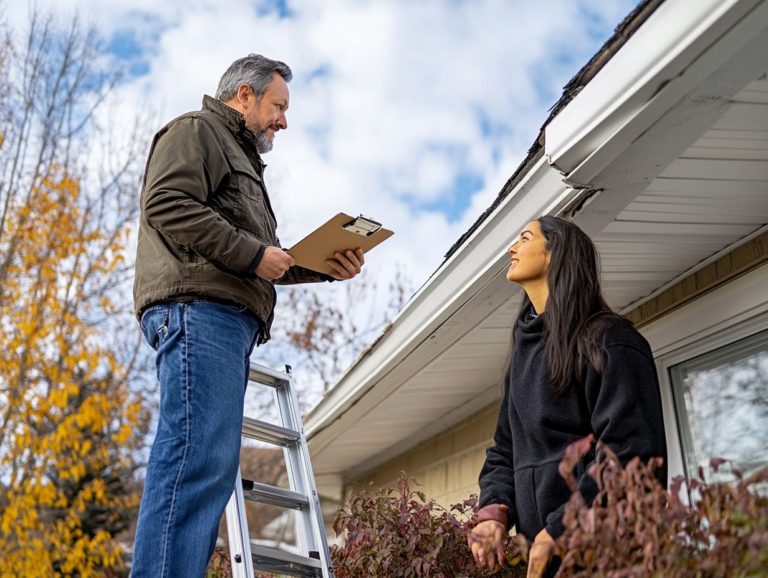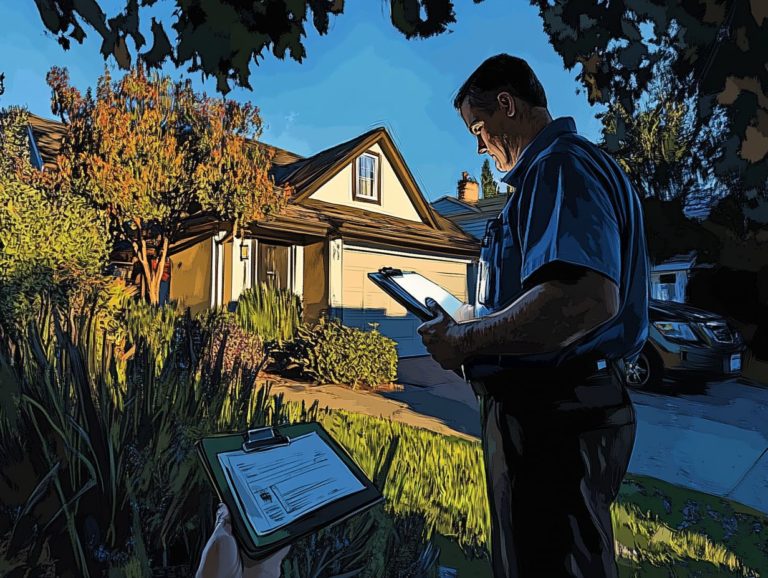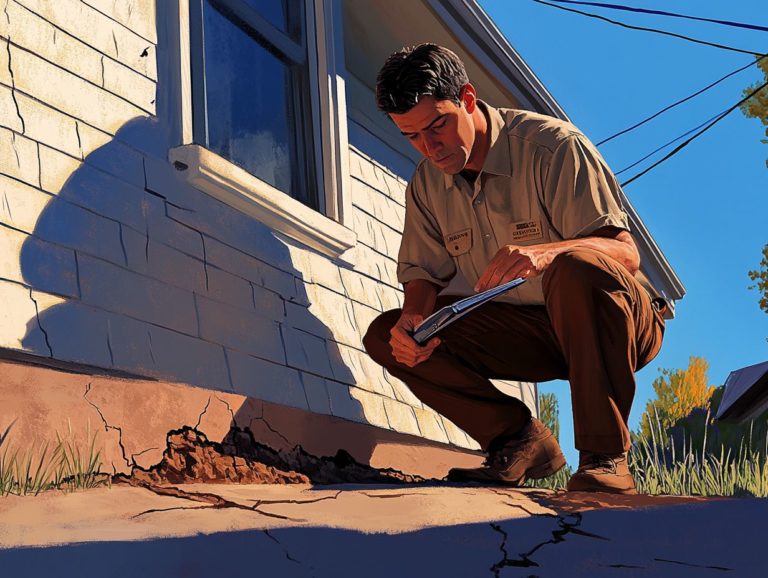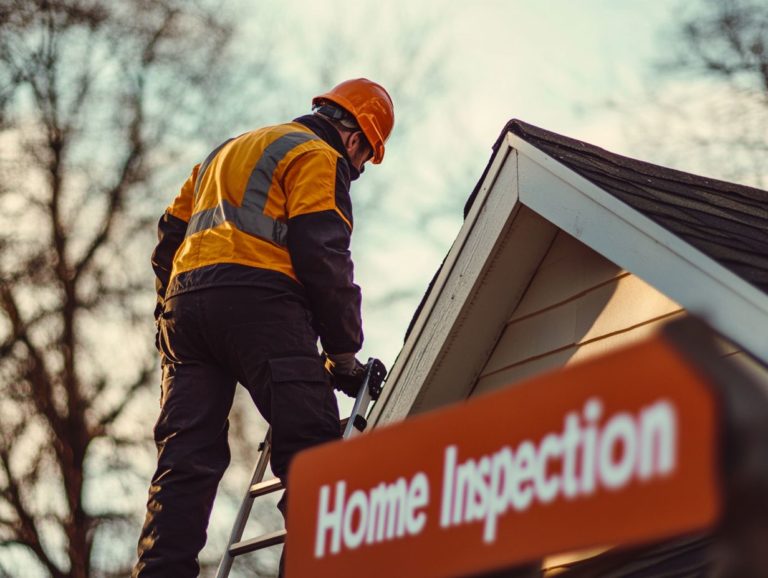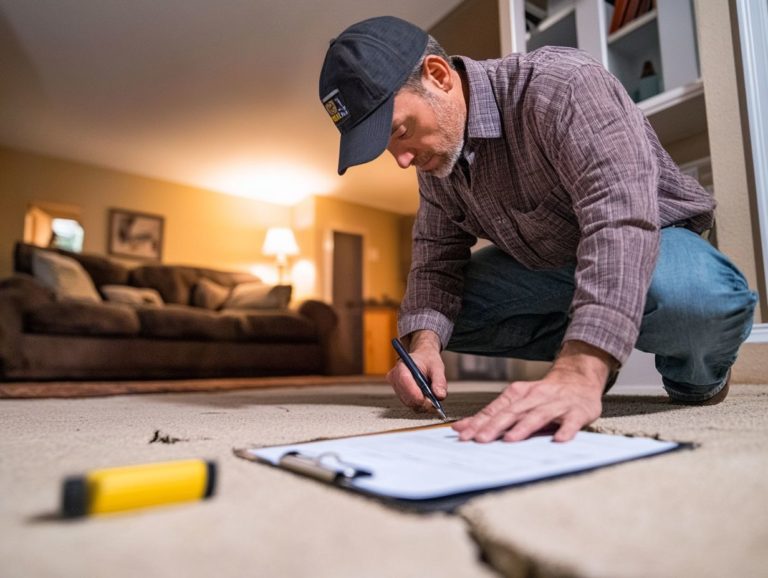How to Handle Post-Inspection Negotiations
Navigating the post-inspection process can be a transformative chapter in your home-buying journey.
Once a home inspection uncovers vital information about a property, grasping the subsequent steps becomes essential.
This guide emphasizes the significance of post-inspection negotiations and provides you with practical strategies for thorough preparation.
From typical negotiation points to managing challenging scenarios, you ll discover how to effectively advocate for your interests, all while ensuring a seamless transition toward finalizing your home purchase.
Contents
- Key Takeaways:
- Understanding the Post-Inspection Process
- Importance of Negotiations
- Preparing for Negotiations
- Effective Negotiation Strategies
- Common Negotiation Points
- Handling Difficult Situations
- Finalizing Negotiations
- Frequently Asked Questions
- What are post-inspection negotiations?
- Why are post-inspection negotiations important?
- Who typically initiates post-inspection negotiations?
- How should I prepare for post-inspection negotiations?
- What should I keep in mind during post-inspection negotiations?
- When should post-inspection negotiations be completed?
Key Takeaways:

- Post-inspection negotiations can significantly alter the home buying outcome.
- Being prepared is key to successful negotiations.
- Focus on key areas and gather necessary information.
- Be ready to handle difficult situations during negotiations.
Understanding the Post-Inspection Process
Grasping the nuances of the post-inspection process is essential for you, whether you’re a buyer or a seller navigating today s dynamic real estate landscape.
In differing market conditions, such as a buyer’s market versus a seller’s market, the stakes can vary significantly.
After a home inspection typically carried out by a qualified real estate professional you ll receive a comprehensive report detailing the property s condition. This report highlights any critical repairs or safety hazards that need addressing, which will be pivotal during negotiations.
This is the phase where the initial deposit and the agreement to inspect the home come into play, shaping the course of negotiations and influencing how both you and the other party approach the closing date.
What Happens After a Home Inspection?
After a home inspection, the inspection report becomes your essential tool in negotiations. It clearly outlines any necessary repairs the seller may need to address.
This comprehensive analysis not only acts as your checklist for required repairs but also gives you the power to engage in meaningful discussions with the seller.
You can leverage the findings to propose specific repairs or upgrades. This effectively allows you to negotiate who will shoulder the costs.
In many instances, sellers may agree to complete critical repairs before closing or they may offer financial concessions.
These concessions could manifest as closing cost credits or a direct reduction in the overall sale price. By skillfully utilizing the home inspection report, you can protect your investment and ensure the property meets your expectations.
Meanwhile, sellers can also maintain a favorable negotiation position, thereby preserving the integrity of the transaction.
Importance of Negotiations
Negotiations are essential in the home buying process, especially after a home inspection. This is the moment when you, as a buyer, and the seller can refer to the role of home inspections in buyer-seller negotiations to decide how to tackle crucial repairs and adjustments in your agreement.
The negotiation process can significantly influence the final outcome. It can lead to seller concessions and buyer concessions, creating a more equitable deal for both parties involved.
Why Negotiations are Necessary
Negotiations after a home inspection are crucial for addressing significant repairs and property defects that could pose safety hazards. Understanding the impact of home inspections on negotiations ensures that both you and the seller are aligned on the necessary actions to be taken.
It s your opportunity to request repair estimates and potentially negotiate a home warranty to cover future issues. Such discussions are vital for protecting your investment and ensuring the home meets safety regulations, which can greatly influence its market value.
For example, if the inspection uncovers a faulty electrical system or plumbing leaks, these aren’t just minor inconveniences; they could lead to serious complications later on.
By highlighting these issues, you can leverage the inspection findings to your advantage. You can potentially ask for credits to be applied toward repairs or the inclusion of warranties for essential systems.
These practical steps not only promote transparency but also help reduce risks for both you and the seller, paving the way for a more informed transaction process.
Start your negotiation journey today, and ensure your new home is perfect for you!
Preparing for Negotiations

Preparing for negotiations is an essential step in your home-buying journey, especially after you receive the home inspection report. This stage provides both you, the buyer, and the seller with crucial information needed for effective discussions, including how to negotiate closing repairs successfully.
To gather the necessary insights, review the inspection findings, understand the repair addendum, and clarify the inspection contingency clause. This ensures that everyone involved is well-informed before diving into negotiations.
Gathering Necessary Information
Organizing repairs means categorizing them based on inspection findings, such as plumbing issues, electrical problems, and foundation concerns. Also, consider local repair services and their timelines.
This approach streamlines the repair process and keeps you and the other party informed about potential costs and timelines for each repair.
Local resources are crucial; collaborating with trusted contractors can lead to quicker turnaround times and more reliable service. Consulting online reviews helps improve service quality and provides insights into each expert’s track record.
By leveraging local resources, you can create an efficient plan that addresses urgent repairs while considering routine maintenance. This ultimately fosters a smoother transaction experience.
Effective Negotiation Strategies
Effective negotiation strategies are essential for securing the best possible outcome in real estate transactions, especially following a home inspection when discussions around repairs and concessions become vital.
Utilizing negotiation tips and tactics that consider market dynamics and the property’s history can significantly improve the buyer-seller negotiation process.
Tips for a Successful Outcome
For a successful outcome in your negotiations, understanding the key selling points of the property while being open to concessions can enhance relationships and offer flexibility before closing.
Creating a positive atmosphere during negotiations is crucial. Both parties should prioritize mutual respect, ensuring everyone feels heard and valued. Clear communication is non-negotiable; express your needs and expectations candidly to avoid misunderstandings.
Adaptability is vital in negotiations. Being willing to pivot based on feedback or changing circumstances can unlock creative solutions. A collaborative approach enhances trust and rapport, making it easier to navigate any hurdles that arise.
Common Negotiation Points
Understand common negotiation points as you navigate the post-inspection phase, particularly regarding negotiating repairs after home inspection, and significant issues highlighted during the home inspection.
These elements frequently become central to negotiations, shaping potential closing cost credits and the overall agreement.
Areas to Focus On

When navigating negotiations, focus on key areas like plumbing issues, electrical problems, roof repairs, and foundation concerns. These factors significantly impact the property’s value and safety.
These aspects influence how livable a space is now and have lasting effects on maintenance costs and resale potential. Acting quickly on plumbing issues can prevent costly repairs later, avoiding disputes and dissatisfaction.
Addressing electrical problems is essential for ensuring safety and compliance with local codes. Recognizing these concerns early and seeking solutions fosters a collaborative atmosphere, leading to more favorable outcomes and a smoother transaction process.
Handling Difficult Situations
Navigating challenging situations in negotiations, especially when dealing with uncooperative parties, is a complex part of the real estate process. It demands both strategic negotiation tactics and a high level of emotional intelligence.
By grasping the underlying dynamics, you can effectively reduce tension and cultivate a more constructive dialogue. This leads to better outcomes for everyone involved.
Dealing with Uncooperative Parties
Dealing with uncooperative parties during negotiations can indeed be a test of patience, but you have the tools at your disposal to turn the tide!
Employing strategic negotiation techniques and calming methods can ease tensions and guide conversations back to a productive path. Understanding the root cause of resistance is essential; it often arises from misunderstandings, unmet needs, or emotional triggers that may unexpectedly escalate into conflict.
By actively listening and showing genuine empathy, you can foster an environment that encourages dialogue. This invites the other party to express their concerns more freely.
Consider techniques like reframing negative statements into constructive feedback or taking brief pauses to regroup. These approaches can effectively diffuse hostility.
Encouraging collaboration can transform a contentious atmosphere into a cooperative effort, significantly boosting the likelihood of reaching a satisfactory agreement.
Finalizing Negotiations
You re about to take a big step! Agreeing on essential terms is crucial as you finalize negotiations in your home buying journey. This process outlines the subsequent steps that will guide you toward a successful closing date and the culmination of your home purchase.
Agreeing on Terms and Next Steps
Agreeing on terms and outlining the next steps is vital for ensuring you and the seller have a clear understanding of closing costs, earnest money, and other legal obligations. This initial dialogue lays the groundwork for a seamless transaction process.
When both parties confirm the terms, they typically include specifics about the earnest money deposit. This is a deposit made to show you’re serious about buying the property. It serves as a security measure and is usually held in escrow. This amount can be applied to your closing costs or returned to you if the deal falls through under certain conditions.
Once agreements are reached, subsequent steps may include inspections, appraisals, and finalizing your financing options each vital in progressing toward the closing date.
By enhancing the clarity of these agreements, you minimize misunderstandings and ensure that everyone involved is on the same page.
Frequently Asked Questions
What are post-inspection negotiations?
Post-inspection negotiations refer to the process of discussing and potentially renegotiating the terms of a contract or agreement after a property inspection has taken place. This can involve negotiating repairs, price adjustments, or other changes based on the findings of the inspection, including tips for negotiating upgrades.
Why are post-inspection negotiations important?
Post-inspection negotiations are important because they allow both parties to address any issues or concerns that may have arisen during the inspection. Utilizing tips for managing post-inspection repairs can help ensure that the transaction proceeds smoothly and that both parties are satisfied with the final terms of the agreement.
Who typically initiates post-inspection negotiations?
Post-inspection negotiations can be initiated by either the buyer or the seller, depending on the specific circumstances of the transaction. However, it is common for the buyer to request negotiations, especially regarding important matters. Knowing how to negotiate repairs after inspection can be crucial if significant issues are found during the inspection.
How should I prepare for post-inspection negotiations?
To prepare for post-inspection negotiations, thoroughly review the inspection report and make note of any major issues or concerns. It can also be helpful to research the cost of repairs or replacements, as this information can be used to negotiate effectively, especially by understanding how to leverage home inspection reports for negotiation for a fair resolution.
What should I keep in mind during post-inspection negotiations?
During post-inspection negotiations, it is important to remain professional and open to compromise. Both parties should aim to find a mutually beneficial solution, and it can be helpful to understand how to handle post-inspection repairs. Being willing to listen and consider each other’s perspectives is key, and additionally, keep a clear record of all negotiations and any agreed-upon changes.
Ready to negotiate like a pro? Let s dive in!
When should post-inspection negotiations be completed?
Talks after an inspection should be finished before the contract deadline. This gives both parties enough time to agree and make necessary repairs.
Completing negotiations quickly is crucial! You can ask for an extension if necessary, but it’s best to wrap things up as soon as possible.


